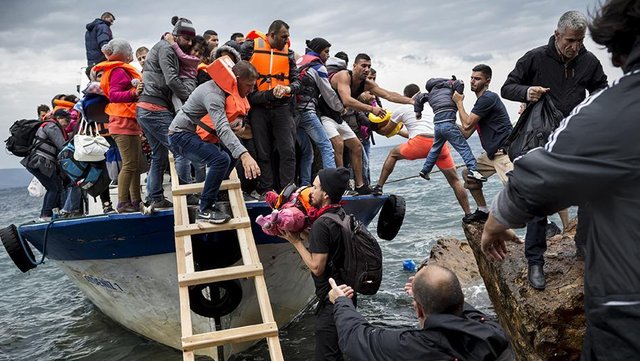Building Blocks - A project by the World Food Programme (WFP)

The refugee crisis seems to have left the mainstream media, as the ongoing political debate between German and other European politicians seems to find no feasible solutions. Honesty, the never-ending arguments of European politicians, just leave everybody frustrated. In the meantime, entrepreneurs and technologists have come up with major innovations that can kill many of the inefficiencies and problems of this crisis, and really improve the lives of many refugees.
Building Blocks is a blockchain project that started in early 2017 to help the World Food Programme (WFP)to transfer money for food aid to over 100,000 Syrian refugees in a camp in Jordan.
The WFP transferred over $1.3 billion for food and aid benefits with local and international banks and governments in 2017. About 30% (!) of its total aid was lost in transactions and other fees - money that could have gone to millions of meals, housing or integration courses.
Early results of the program showed a 98% reduction in such fees. According to MIT Technology review, by the end of this year, the program will cover all 500,000 refugees in the country.
Can this fulfill the high expectations of the social impact that blockchain technology has been praised with?
Many experts claim blockchain can disrupt entire industries, change the world, and lift people out of poverty. I have even heard people saying that this technology can stop wars from happening. So far, the most common thing I have seen are scammy startups raising millions of dollars without any product or track record, just because they use the hype word of the year “blockchain”.
German bureaucrats have failed miserably to handle the masses of refugees that came to our border in the hope to find shelter, financial aid and a job to start a new life.
Once asylum seekers have been pre-registered in Germany, they are sent to reception centres, often former army barracks with several hundred beds. According to the Financial Times, less than 20% of refugees from war-torn and crises-afflicted countries — like Afghanistan, Iraq, Nigeria, or Syria — had jobs in June 2017.
Well, what do you do when a hungry and traumatized man that lost all his belongings on the way tells you: He is Ahmad from Syria, 24 years old and has a computer science degree. Of course, he can’t prove any of that. Do you trust him or not? He could just as well be part of a terrorist organization. It is really not easy.
However, Building blocks’ solution can solve more than just the money transaction inefficiencies. This technolofy can solve the biggest issues that politicians in Europe are currently unable to solve. Which is to integrate refugees that don’t have a bank account and lost all of their legal documents when they fled from their homes.
Such a record, stored on a decentralized ledger, could let someone like Ahmad take his data from Syria to Germany and beyond, backed up online and secured by encryption. Syrian refugees often already have smart phones and could use such a system to regain legal identities that were lost along with their documents and assets when they fled their homes.
In this scenario, Ahmad could move to Germany - or back to Syria - and easily prove his educational credentials, demonstrate his relationship to his children, find a job or even get a loan to start his own business.
Technology
Building Blocks has integrated an existing biometric authentication technology called IrisGuard that allows refugees to identify themselves and pay at the supermarket by scanning their eyes. The project was first rolled out on the Ethereum public blockchain, but transactions were slow and expensive. The current version of Building Blocks runs on a private, version of Ethereum, which is entirely controlled by the WFP.
A glimpse into the future
Whether Building Blocks will put ownership of these digital IDs in the hands of the people being represented or simply make it an easier way for governments and corporations to control people’s digital identities and data is questionable. I hope that this system will be decentralized in the future, where users have full control of their own identity, data, and money.
With the right people and intentions behind this technology, it has the potential to drastically reduce corruption and terrorism.
Building blocks is part of the WFP innovation program in Munich and was recently covered in a MIT technology review and the World Economic Forum.
You can find out more about the project here. http://innovation.wfp.org/project/building-blocks
Congratulations @ludolfschoening! You received a personal award!
Click here to view your Board of Honor
Downvoting a post can decrease pending rewards and make it less visible. Common reasons:
Submit
Congratulations @ludolfschoening! You received a personal award!
You can view your badges on your Steem Board and compare to others on the Steem Ranking
Vote for @Steemitboard as a witness to get one more award and increased upvotes!
Downvoting a post can decrease pending rewards and make it less visible. Common reasons:
Submit